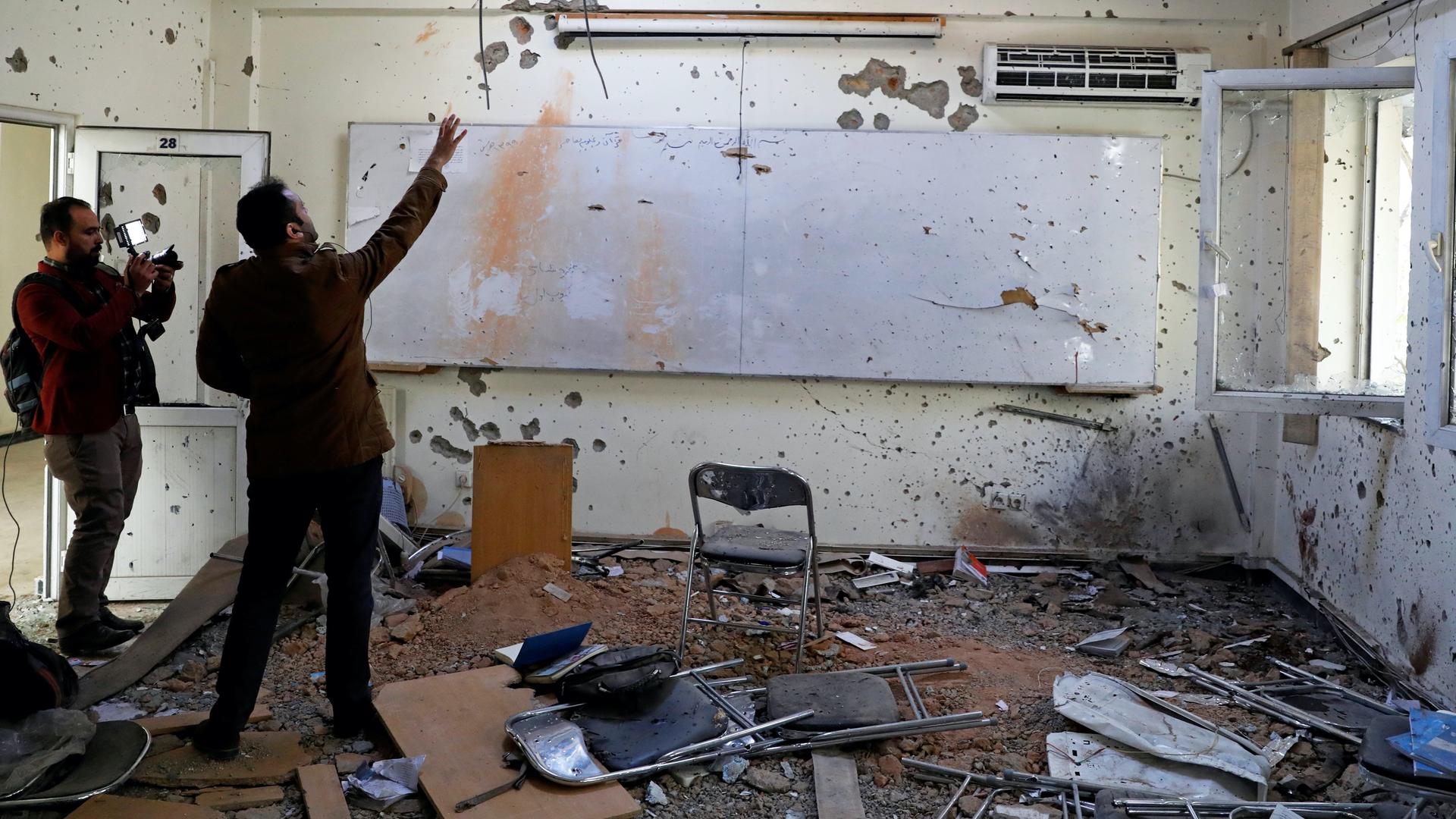These days, it seems like Afghans barely have time to mourn.
All over the country, families get news of loved ones killed in violent attacks.
They weep. Bury the dead. And repeat.
Related: Fighting in Afghanistan claims lives as peace talks drag on
The latest attack took place on Monday when gunmen stormed Kabul University and killed students in their classrooms.
The attack is one of many that have shaken Afghanistan in recent weeks. ISIS, as well as the Taliban, have stepped up their attacks amid peace talks between the Afghan government and the Taliban. The two sides have been meeting in Doha, Qatar, but progress has been slow.
On Monday, photos online showed panicked students scrambling to climb the campus walls to safety. Concerned relatives showed up to get news of their loved ones.
Head of Kabul University students’ union, Omid Mehriyar, was on the scene and collected victims’ cellphones to connect with their relatives.
Member of Parliament Naheed Farid tweeted a quote from Mehriyar: “I was scared,” he said. “Some had calls from their mothers and fathers. I couldn’t relay the news to them. Then, I saw one of the victims had 142 missed calls. And there was a final message [that read] ‘my beloved, where are you?'”
Related: Afghan peace talks set to start despite escalating attacks on politicians
It took Afghan security forces five hours to bring the situation under control. By the time it was all over, at least 22 students had been killed and dozens were injured.
The Afghanistan branch of ISIS took responsibility for the attack.
‘Keep smiling’
One of Monday’s victims was 22-year-old Mohammad Raheb.
He studied public policy but was also a motivational speaker. His friends described him as a fierce debater and an optimist.
“Life is full of challenges, full of problems and sadness,” he said in one motivational video posted on social media. “But we have to keep smiling. We have to keep living.”
Samiullah Mahdi, a professor at Kabul University, said Raheb was one of his brightest students.
“Such a beautiful soul, such a beautiful person [with] so much energy. But unfortunately, we have lost him now.”
“Such a beautiful soul, such a beautiful person [with] so much energy. But unfortunately, we have lost him now,” Mahdi said.
Mahdi described Monday as one of the worst days of his life. When The World reached him a few hours after the attack, he said he was still processing the news. He had lost so many of his students.
“I have known them closely for a number of years now,” Mahdi said. “They were not only my students but also my friends.”
Related: A newborn survived an attack at a hospital in Afghanistan. Now the long recovery begins.
ISIS killing spree
ISIS said it carried out Monday’s attack. Just days before, it had staged another attack — a suicide bombing at the Kawsar-e-Danish education center in western Kabul, a neighborhood where ethnic Hazara are the majority.
At least 30 people died in last week’s attack; most were high school students who were taking classes to prepare for their university entrance exam.
The Hazara people have long endured atrocities at the hands of ISIS and other groups, said Lina Tori Jan, a student at Oxford University.
Born in the same neighborhood where the attack took place, Tori Jan remembered the challenges of growing up as a member of the Hazara community. She said the recent attacks are just the latest chapter in a long history of discrimination against the group.
“It starts with dehumanizing a community through the differences. The difference that they see in us is that we look Asian, that we don’t fit the picture that they want Afghanistan to be presented.”
Tori Jan remembers studying English at an education center similar to the one that was targeted last week.
“When I went to classes, when I went for education, I saw the discrimination of my teachers. I saw the discrimination of my classmates. To be Hazara, you were not welcome,” she said.
Over the weekend, Tori Jan and her fellow students at Oxford University organized an outdoor vigil for the victims of the Kawsar education center. Students held banners that read “Hazara Lives Matter.”
Tori Jan said ISIS targets education centers and universities because it is afraid of a young generation that is educated and confident.
Asfandyar Mir, who studies militant groups in Afghanistan at Stanford University, said ISIS made a reference to this point in its propaganda published right after Tuesday’s attack.
“In the claim that the Islamic State has issued, they say that they have killed trainees and prosecutors who, of course, have a major role in the justice system in Afghanistan … who could go on to become lawyers and hold members of the Islamic State accountable for their crimes.”
“In the claim that the Islamic State has issued, they say that they have killed trainees and prosecutors who, of course, have a major role in the justice system in Afghanistan,” Mir said, “who could go on to become lawyers and hold members of the Islamic State accountable for their crimes.”
Related: Why the US is to blame for its own defeat in Afghanistan
On Tuesday, families once again gathered to bury the victims.
Some Afghans told The World that the scars left by these atrocities will take a long time to heal.
And as defiant as they are, some days, they said, it just seems too hard to carry on.
Our coverage reaches millions each week, but only a small fraction of listeners contribute to sustain our program. We still need 224 more people to donate $100 or $10/monthly to unlock our $67,000 match. Will you help us get there today?
